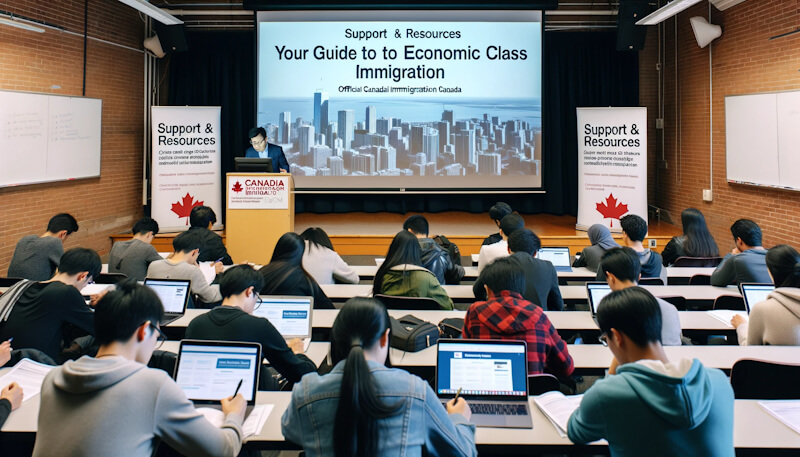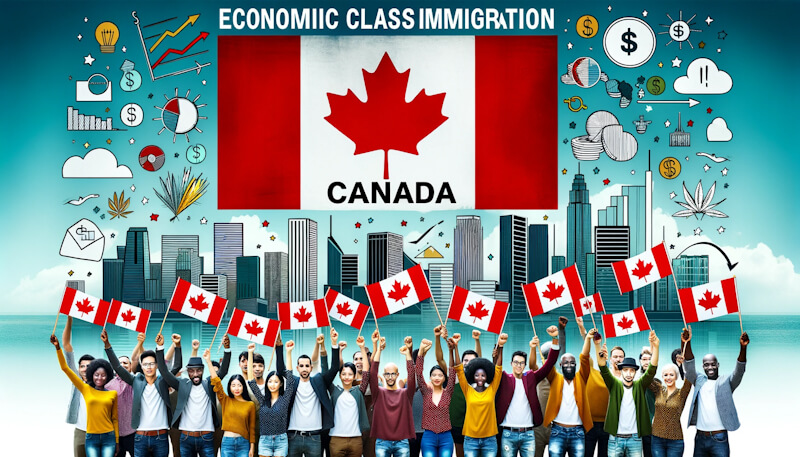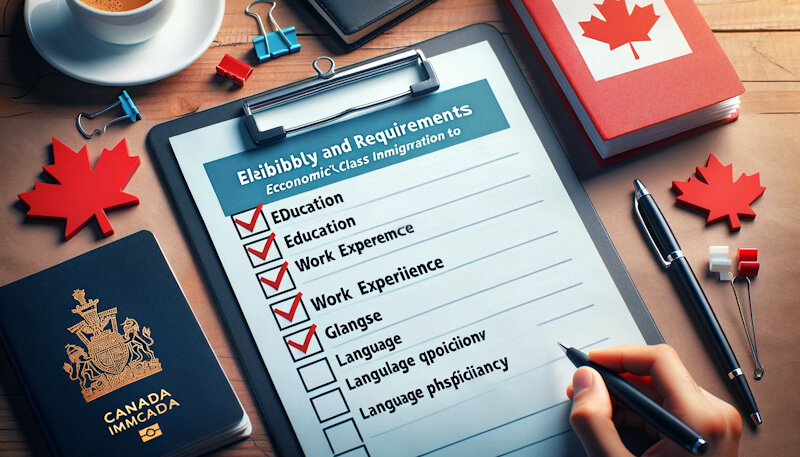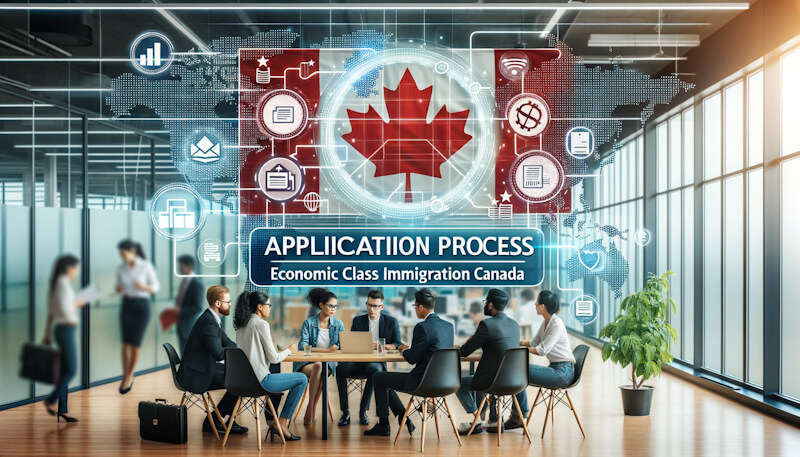What is Economic Class Immigration Canada?
Your Quick 30-Second Answer!
Economic Class Immigration Canada is for individuals with skills and resources to contribute to Canada's economy. The primary pathway is the Express Entry system, which manages applications for programs like the Federal Skilled Worker Program, Federal Skilled Trades Program, and Canadian Experience Class. To qualify, you'll need to create an online profile and score points based on factors like age, education, and language proficiency. Regular draws invite top candidates. Keep an eye on the Comprehensive Ranking System (CRS) cut-off scores, which fluctuate. Additionally, explore Provincial Nominee Programs (PNPs) if you want to immigrate to a specific province. Language proficiency, Educational Credential Assessment (ECA), and a job offer can boost your chances.
For an in-depth overview, please see the "Table of Contents" below.
Your Guide to Economic Class Immigration Canada
Welcome to this easy-to-follow guide on the Economic Class Immigration Canada. Primarily, this guide is for anyone who wants to learn about immigration to Canada. This guide is here to make everything clearer and simpler for you. If you find the official rules and documents about the requirements to move to Canada confusing, this guide can be your helpful friend. It’s here to give you clear and easy help so you can understand how Canadian permanent residence works without any problem.
TABLE OF CONTENT
Basic Introduction
1. Overview: Economic Class
2. What is Economic Class?
3. Types of Economic Class
Eligibility and Requirement
4. Who is Ideal Candidate?
5. Am I eligible?
Application Process
6. How do I apply?
Additional Resources
7. Common questions (FAQs)
8. More helpful resources

1. Economic Class Immigration in Canada
What is Economic Class Immigration in Canada?
Economic Class Immigration is one of the three main categories for immigrating to Canada, alongside Family Class and Refugee Class. It's designed for individuals with the skills, experience, and financial means to contribute to Canada's economy.
Express Entry System: The Key to Economic Class Immigration
The primary pathway under Economic Class Immigration is the Express Entry system. It manages applications for three federal economic immigration programs:
- 1. Federal Skilled Worker Program (FSWP)
- 2. Federal Skilled Trades Program (FSTP)
- 3. Canadian Experience Class (CEC)
How Does Express Entry Work?
Candidates create an online Express Entry profile, which is scored based on various factors like age, education, work experience, language proficiency, and more. The highest-scoring candidates are invited to apply for permanent residence through regular draws.
Points-Based System
To qualify for Express Entry, you need to score a minimum number of points based on the Comprehensive Ranking System (CRS). The CRS assigns points for various factors, with a maximum of 600 points available.
Latest CRS Cut-Off Scores
The CRS cut-off scores fluctuate with each draw. To stay updated, check the official website of Immigration, Refugees, and Citizenship Canada (IRCC) regularly.
Provincial Nominee Programs (PNPs)
In addition to Express Entry, many provinces and territories have their own economic immigration programs. These Provincial Nominee Programs (PNPs) allow them to nominate candidates based on their specific needs.
Language Proficiency
Language proficiency is crucial for Economic Class Immigration. You'll need to take an approved language test (like IELTS) and include your scores in your Express Entry profile.
Education Credential Assessment (ECA)
If you obtained your education outside Canada, you may need to get an Educational Credential Assessment (ECA) to prove the equivalency of your foreign credentials.
Job Offer
While not always required, having a valid job offer from a Canadian employer can significantly boost your CRS score and chances of receiving an invitation to apply.
Final Words
Economic Class Immigration to Canada through the Express Entry system offers a promising opportunity for skilled individuals to make Canada their new home. Stay updated with the latest information on the official IRCC website and start preparing your profile to improve your chances of success. Remember that the immigration process may change, so always rely on official sources for the most current information. Good luck with your Canadian immigration journey!
2. What is Economic Class Immigration in Canada?
A. Explanation of Economic Class Immigration Canada
When we talk about economic class immigration in Canada, we are discussing a pathway or a door, specifically designed for talented individuals with specific job skills, and their families, to enter and live North America (Canada and United States).

Picture Canada as a large company that needs various professionals. Just as a company issues job advertisements, Canada offers spots under this immigration category for experts worldwide. These aren't just any jobs; these are roles that demand certain talents, special training, or education that are in short supply in Canada.
A. What Does Economic Class Immigration Mean?
In simpler terms, economic class immigration is akin to Canada sending out a worldwide job opening notification. But instead of looking for just one type of employee, Canada is searching for professionals in various fields. These aren't just any fields; they are sectors of work that are essential to Canada's economic growth and societal well-being. For instance, if there's a shortage of nurses and the healthcare sector is strained, economic class immigration is one way Canada can invite professionals to help fill these critical roles.
In Simple Words:
So, economic class immigration Canada is all about what you can do well. If you have skills, experience, and can speak English or French, Canada might just be the perfect place for you to work and live. Each program has its rules, but they're all about finding the right job for the right person. Remember, it's like matching puzzle pieces: you fit right in where you're needed!
3. Are there different types of Economic Immigrants?
Economic Class Immigration in Canada: Clear, Simple, and Detailed
Imagine a country as a big company. Just like how a company needs people to do different jobs, a country also "invites" people from other places based on what skills or talents they bring to help the country grow and prosper. Let's take a look at the primary economic immigration programs available in Canada:
The primary pathway under Economic Class Immigration is the Express Entry system. It manages applications for three federal economic immigration programs:
- 1. Federal Skilled Worker Program (FSWP)
- 2. Federal Skilled Trades Program (FSTP)
- 3. Canadian Experience Class (CEC)
Here is a more detailed list of the programs:
Canada's economic class immigration isn't a one-size-fits-all program; it's a collection of several programs, each with its unique set of rules and criteria.
1. Federal Skilled Worker Program (FSWP): This program is like a special invitation for people with certain skills that Canada's economy really needs. It's for those who are good at their jobs and have been educated in their field. Think of it as Canada asking you to join because you're good at what you do, like a great doctor, teacher, or computer expert. But, you need to speak English or French well because you'll be living and working in Canada.
2. Federal Skilled Trades Program (FSTP): Now, this one is for the people who are excellent with their hands and have learned a trade skill. These skills could be anything from cooking in a big restaurant to building houses or fixing electrical wires. It's like when a company looks for a mechanic because all their trucks are breaking down. You need to be already good at your job and be able to talk in English or French.
3. Canadian Experience Class (CEC): Imagine you went to Canada to study or work temporarily, and now you love it so much you want to stay forever. This program is for you! If you've been working in a skilled job in Canada for at least a year and can handle English or French conversations at work, you can apply. It's like getting a full-time job after an internship because they liked your work.
4. Start-up Business/Visa Program: This program is designed for successful entrepreneurs. It aims to help them settle permanently in Canada by launching new businesses. These businesses must be innovative, create jobs for Canadians, and have the potential for global competitiveness.
5. Self-employed Persons Class: The Self Employed Visa Canada program is designed to attract individuals who are self-employed in certain fields such as arts, culture, or athletics, and are interested in moving to Canada to continue their work under their own employment.
6. Atlantic Immigration Pilot Program (AIPP): There are four places in Canada - Newfoundland and Labrador, Prince Edward Island, Nova Scotia, and New Brunswick - that really want more skilled people to come and work. It's not just about having the right job skills; you need a job offer from a company in one of these places. It's like a seaside town needing lifeguards and asking for people who can swim well to apply.
7. Agri-Food Immigration Pilot: Canada needs people to help in certain food-related jobs. If you've got experience working on a farm, in a greenhouse, or with animals, or you know how to process meat, this could be your way in. You need to have a job offer in one of these fields, though. It's like a big apple orchard needing extra hands during harvest season and asking for experienced pickers.
8. Rural and Northern Immigration Pilot (RNIP): Some communities in Canada aren't big cities, and they're looking for skilled workers too. These places get to pick the people they need, and in return, those people get to live in a nice community and contribute there. It's like a small village needing a baker and looking specifically for someone who makes excellent bread.
9. Caregivers: If you're from another country and either have a caregiving job offer in Canada or have worked caregiving in Canada for 12 months (relevant work experience), this is for you. If you're aiming for the child care or home support jobs, there are some basic schooling (educational requirements) and language skills (language requirements) you'll need.
4. Ideal Candidate for "Economic Class Immigration Canada"
Who is the Perfect Person for Economic Class Immigration Canada? Let's Find Out!
1. Quick to Adapt: Imagine you move to a new town, and in no time, you know all the best places to eat, the shortcuts to get around, and you've even made new friends. That's adaptability! Canada loves people who can dive into a new place and feel at home quickly. If you've studied or worked in Canada before or have family there, that's a big plus!

2. Good with Languages: Speaking English or French well, or even better, both, is like having a golden ticket in Canada. It's not just about saying "hello" and "thank you." It's about feeling comfortable talking to anyone, understanding work instructions, and making jokes with your colleagues during lunch.
3. Just the Right Age and Timing: Applying for economic class immigration in Canada is like waiting for the perfect moment to take a picture. You need good lighting, a great pose, and no one blinking! It means you should apply when you're still young, but also when Canada is looking for someone just like you. Keep an eye on what jobs Canada needs most and when it's the best time to apply.
4. Never Stops Learning: Imagine you're a chef, and you keep learning new recipes, or you're a computer whiz learning the latest tech magic. Canada is looking for people who never stop learning. If you've got new certificates, especially from Canadian schools, or you're skilled in something Canada needs (like caring for older people or building clean-energy windmills), that's fantastic!
But Wait, There's More: Not-So-Known Tips about Economic Class immigration Canada!
1. Every Province is Unique: Canada's provinces are like different-flavored ice creams. They each have their favorite kind of sprinkles (skills and workers) they want! Some might need more nurses, while others want tech geniuses. If you find out what each province likes and you match, they might pick you!
2. Small Towns Have Big Hearts: There's a special program (RNIP) for smaller places in Canada that are like tight-knit families. They're not just looking for any worker; they want new family members! So, if you show them you really want to be part of their community, you've got a good chance.
Secret Tips for Success:
1. Not Just Book-Smart: Canada wants people who are more than just book-smart. They want people who can solve problems, be kind to others, and work well with everyone. So, tell them about times you helped solve a big problem at work or made a tough project a success.
2. Fit in and Stand Out: Show Canada how you can fit in like a missing puzzle piece. Tell them how you share their values, like being kind to everyone no matter where they're from. But also show how you're unique and how your personal story is something special they won't find anywhere else.
Remember, economic class Canada isn't just about filling a job; it's about finding a new home where you fit in and make things even better. So, show them not just why you're the right worker, but also why you're the perfect new Canadian! And don't forget, rules can change, so always check for the latest info or ask an expert if u're unsure. It's like checking the weather before a picnic. You want to be ready for anything!
5. Am I Eligible to Apply for Economic Immigration?
Let's simplify the details on Eligibility Criteria for Economic Class Immigration Canada:
PROGRAM REQUIREMENTS
Federal Skilled Worker Program
Education: Show your learning papers, like diplomas or degrees.
Work: 1-year work at a skilled job.
Language: Talk well in English or French.
Points: Get scores for age, work, language, and more.
Jobs: Doctor, teacher, IT person, boss.
Federal Skilled Trades Program
Work: 2 years recent work in a trade.
Job Offer: Need paper saying you have a job in Canada.
Language: Know enough English or French for work.
Jobs: Electric person, cook, pipe fixer, build things.
Canadian Experience Class
Canada Work: Worked in Canada for 1 year in skilled job.
Language: Talk good in English or French.
Jobs: Many kinds like boss, skilled trade, professional.
Provincial Nominee Program
Needs: Each place in Canada has different needs.
Job Offer: Need job paper for certain place in Canada.
Jobs: Changes by place. Health person, IT person.
Atlantic Immigration Pilot Program
Job Offer: Need job paper from Atlantic side of Canada.
Work: Skilled job experience for 1 year.
Education Check: Show your school is good.
Language: Talk enough for job in English or French.
Jobs: Health person, service job, skilled trade.
Rural and Northern Immigration Pilot
Recommend: Someone in local place says you are good.
Work: Skilled job for 1 year in past 3 years.
Job Offer: Paper for full-time job in special place.
Language: Talk well in English or French.
Jobs: Depends on place. Could be hotel boss, truck driver.
Agri-Food Immigration Pilot
Work: Did certain farm work in Canada recently.
Job Offer: Paper for full-time, all-year job in certain farm work.
Language: Need some English or French.
Education: Finished high school.
Let's break down the essentials of economic class immigration Canada so they are easy and simple to understand.
Getting into the world of economic class immigration Canada can seem daunting, almost like preparing for a major job interview. You want to put your best foot forward, impress the interviewers, and land that dream job, right? Similarly, understanding the eligibility criteria is like knowing the questions beforehand. Let's unravel these "questions" you need to prepare for, program by program, while also shining a light on the not-so-obvious yet equally important aspects. We’re here to not just help you get ready, but to wow the "interviewers"!
1. Federal Skilled Worker Program (FSWP):
- Credentials:
- Think of this as your resume. Canada wants to see your education (certificates, diplomas, degrees), your work history (at least one year of full-time work in a skilled profession), and language skills (you need to be proficient in English or French).
- Points System:
- This is your "interview scorecard." Points are given for your age, foreign or Canadian education, work experience, whether you have a job offer in Canada, adaptability, and language skills. It’s like getting grades, but for how well you match Canada’s needs.
- Job Types:
- Professionals like doctors, teachers, IT professionals, and managers are high in demand. Imagine a school looking for teachers; that's how Canada is searching for skilled workers.
2. Federal Skilled Trades Program (FSTP):
- Work Experience:
- Hands-on skills are key here. You need at least two years of full-time work experience in a skilled trade in the last five years.
- Job Offer:
- A solid job offer from a Canadian employer (like a contract letter) or a certificate of qualification in your skilled trade issued by a Canadian province or territory.
- Language Skills: Basic English or French is a must, just enough to get by your daily job tasks.
- Job Types: Tradespeople are in the spotlight! Electricians, chefs, plumbers, or construction workers, for example.
3. Canadian Experience Class (CEC):
- Canadian Work Experience:
- This is where your Canadian "insider" status comes in handy. You need at least 12 months of full-time (or an equal amount in part-time) skilled work experience in Canada in the last three years.
- Language Skills:
- Proficiency in English or French is necessary, akin to how a local would communicate in everyday life. This can give you advantage in economic class immigration Canada.
- Job Types:
- Various roles apply, like manager positions, professional jobs requiring a university degree, or technical jobs and skilled trades.
4. Provincial Nominee Program (PNP):
- Specific Requirements:
- Each province has a list, like a shopping list, of what they need. This could be certain job skills, language proficiency, or a connection to the province, like having family there.
- Job Offer:
- Many provinces require that you have a job offer in that province.
- Job Types:
- These vary widely based on the province. For instance, Alberta may be looking for health care professionals, while British Columbia might need IT professionals.
5. Atlantic Immigration Pilot Program (AIPP):
- Job Offer:
- You need a job offer from one of the Atlantic provinces, similar to an invitation to a party.
- Work Experience:
- At least one year of work experience related to your job offer.
- Educational Credential Assessment (ECA):
- This shows that your foreign education is valid, like a stamp of approval.
- Language Skills:
- Enough English or French to perform your job effectively.
- Job Types:
- Jobs in demand in the Atlantic provinces, for instance, in sectors like healthcare, service industry, or skilled trades that fall under economic class immigration Canada.
6. Rural and Northern Immigration Pilot (RNIP):
- Recommendation from Designated Community:
- It’s like having a local vouch for you because they believe you will fit in well.
- Work Experience:
- At least one year of continuous work experience in the past three years, showing you're not new to the professional world.
- Job Offer:
- A full-time permanent job offer from one of the participating communities, your ticket to the community.
- Language Skills:
- You need to communicate well in English or French, to live and work in the community.
- Job Types:
- Depends on what the community needs, which could be anything from hospitality managers to transportation truck drivers.
7. Agri-Food Immigration Pilot:
- Work Experience:
- Non-seasonal Canadian work experience in the past three years in specific industries is your golden ticket here.
- Job Offer:
- A full-time, non-seasonal job offer in Canada in certain agricultural industries.
- Language Skills:
- Basic English or French, just enough to be safe and effective at your job.
- Job Types:
- Meat processors, farm supervisors, and specialized livestock workers, for instance.
- Innovative Business Idea:
- Picture this as your groundbreaking project. You must have a fresh start-up idea that has the potential to compete on a global scale.
- Support from Designated Organizations:
- Consider this a letter of recommendation. You need support from a designated Canadian investment group, venture capital fund, or business incubator. They need to believe in your idea just as much as you do!
- Ownership Requirements:
- You must hold a significant percentage of the equity in the business, ensuring you have a say in its operations.
- Language Skills:
- Good communication is key. You must meet a minimum level of proficiency in English or French to actively participate in the business.
- Sufficient Settlement Funds:
- This ensures you can support yourself and your family while your business is growing. Think of it as your safety net.
- Job Types:
- This is for the innovators, the dreamers, and the entrepreneurs. Those who are not just thinking about the ‘now’ but inventing the ‘next’!
9. Self-employed Persons Class:
- Relevant Experience:
- Your portfolio matters. You need at least two years of self-employed experience in cultural activities, athletics, or farming, depending on your field to qualify for economic class immigration Canada.
- Intention and Ability to Be Self-Employed in Canada:
- You must plan to continue your self-employed work in Canada. It's like promising you'll keep painting if you're an artist.
- Language Skills:
- Although not mandatory, language proficiency in English or French can earn you points for adaptability.
- Medical, Security and Other Requirements:
- You must be healthy, law-abiding, and willing to adapt to life in Canada.
- Job Types:
- This category is for the creative and the disciplined — artists, athletes, farmers, and more. It’s for individuals who carve their path, like a painter in front of a blank canvas.
Remember, it's not just about meeting the basic requirements but shining as a top-notch candidate. Just like in real life, going the extra mile can put you ahead in the race for economic class immigration in Canada.
6. How Can I Apply for Economic Class Immigration Canada?
Navigating the Application Process for Economic Class Immigration Canada:
Getting started on the journey to a new life in Canada through economic class immigration requires an understanding of the basics: the requirements and the steps involved in the application process.

This pathway is an incredible opportunity for skilled individuals worldwide, beckoning them to a life filled with numerous professional and personal growth opportunities. In this guide, we will provide a detailed yet easy-to-understand breakdown of the application process for economic class immigration Canada.
Step-by-Step Process for Economic Class Immigration
1. Determine Eligibility: First, you need to see if Canada considers you eligible, or in other words, the right fit for economic class immigration. You can use online tools provided by the Canadian government's immigration website to check this. These tools usually ask questions about your background, like your nationality, age, language ability, family members, education, work experience, income and/or net worth, and details on any job offer. Based on your answers, you'll know if you meet the criteria. Also, talking to an immigration expert or consultant can help clarify things.
2. Prepare Documents: Next, get your papers in order. You'll need:
- Language tests: These are tests like the IELTS (for English) or TEF (for French) to show how well you speak, read, write, and understand.
- Education assessments: If you went to school outside Canada, you might need an Educational Credential Assessment (ECA) to show that your education is valid and equal to a Canadian one.
Keep these documents safe, as you'll need to show them to the Canadian government.
3. Choose the Right Program: Economic class immigration in Canada has different programs, and each one looks for different kinds of skilled people. You should choose one that fits your skills, experience, and, sometimes, where in Canada you want to live. For example, some programs are for people who have a job offer in Canada, while others are for people who have certain skills that are needed.
4. Submit the Application: Once you've picked the right program under economic class immigration Canada, it's time to apply. Most people apply online, which means you'll fill out forms on a computer and upload your documents. Some people might need to or choose to apply with paper forms. Either way, make sure every detail is correct and complete.
5. Wait for Invitation: After you apply, there's a waiting period. You might be invited for an interview or to apply for a visa, which is a special permission to come to Canada. This step can feel slow, but it's important because Canada is checking everything to make sure you'll be a good fit.
(Note: This guide simplifies the information. For questions or advice specific to your situation, it's a good idea to speak with a registered immigration consultant or lawyer.)
7. What Are Some Common Questions About Economic Immigration?
Q1. What are the different types of Economic Class Immigration programs in Canada?
Q1. What are the different types of Economic Class Immigration programs in Canada?
A1. There are various types of Economic Class Immigration programs in Canada, including the Federal Skilled Worker Program, Federal Skilled Trades Program, Canadian Experience Class, Provincial Nominee Program, and Business Immigration Program.
Q2. What is the Express Entry system in Economic Immigration Canada?
Q2. What is the Express Entry system in Economic Immigration Canada?
A2. The Express Entry system is an online system used by IRCC to manage applications for permanent residence from skilled workers through certain Economic Immigration Canada programs.
Q3. What are the eligibility criteria for Economic Class Immigration Canada?
Q3. What are the eligibility criteria for Economic Class Immigration Canada?
A3. The eligibility criteria for Economic Class Canada vary depending on the specific program. However, generally, factors such as skills, work experience, language ability, education, and financial stability are considered.
Q4. What language tests are accepted for Economic Immigration Canada?
Q4. What language tests are accepted for Economic Immigration Canada?
A4. For Economic Immigration Canada, you will typically need to take a language proficiency test in either English or French. Accepted tests include IELTS, CELPIP, and TEF.
Q5. What documents do I need to apply for Economic Immigration Canada?
Q5. What documents do I need to apply for Economic Immigration Canada?
A5. Required documents for Economic Class Immigration typically include a passport, proof of work experience, educational credentials, language proficiency tests, police certificates, medical examination, and proof of funds.
Q6. How much does it cost to apply for Economic Class?
Q6. How much does it cost to apply for Economic Class?
A6. The cost of applying for Economic Class varies depending on the program. It typically includes application processing fees, right of permanent residence fee, and possibly a biometrics fee.
Q7. How long does the application process for Economic Class Immigration take?
Q7. How long does the application process for Economic Class Immigration take?
A7. The processing time for Economic Immigration Canada can vary greatly depending on the specific program and the volume of applications. Generally, it can range from six months to over a year.
Q8. Can I work in Canada while waiting for my Economic Class Immigration Canada application to process?
Q8. Can I work in Canada while waiting for my Economic Class Immigration Canada application to process?
A8. Depending on your circumstances, such as if you have a valid work permit, you may be able to work in Canada while your Economic Immigration Canada application is processing.
Q9. Can I bring my family with me under the Economic Class program?
Q9. Can I bring my family with me under the Economic Class program?
A9. Yes, you can bring your spouse or common-law partner and dependent children with you under the Economic Class Immigration program, although there are additional requirements and fees for family members.
Q10. How can I increase my chances of success in the Economic Class Immigration application?
Q10. How can I increase my chances of success in the Economic Class Immigration application?
A10. To increase your chances of success in the Economic Class Canada application, prepare well in advance, provide complete and accurate information, brush up on your language skills, and consider consulting an immigration professional.
8. Where Can I Find More Helpful Resources and Links?
Here is link that could be useful for individuals looking on information on Economic Class Immigration Canada. Government of Canada's official immigration and citizenship website: Immigrate to Canada. Check out these links for the latest information. For advice tailored to your situation, consider talking to a legal expert or trusted immigration consultant.

Kamal Akhtar is a Canadian immigration lawyer licensed by the Law Society of Ontario. Based in Ontario, Canada. Kamal has years of experience helping foreign nationals with immigration applications and appeals. He specializes in Canadian immigration law and other complex entry solutions. Kamal dedicates himself to delivering honest, strategic, and client-centered legal solutions for every case.
Kamal's credentials include a Bachelor of Law (LL.B.) and a Master of Law (LL.M.) from Osgoode Hall Law School in Toronto. Kamal is a noted member of professional associations like the Canadian Immigration Lawyers Association (CILA), the Canadian Association of Professional Immigration Consultants (CAPIC), the Canadian Bar Association (CBA), and the Ontario Bar Association (OBA). Over 20 years of legal experience shape Kamal's insights.
Please note that the information provided on this website does not constitute legal or professional advice.
Phone: +1 (289) 216-4666 | Fax: +1 (289) 778-4745 | Email: info@kamallaw.ca



